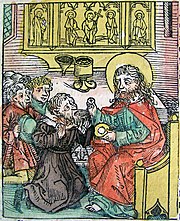Callistus II
Callistus II (in Latin, Callistus PP. II), secular name Guido de Borgoña (Burgundy, c. 1050-Rome, December 13, 1124), was 162.° pope of the Catholic Church between 1119 and 1124.
Biography
Son of Count William I of Burgundy.
In 1088 he was appointed Archbishop of Vienne, becoming a great defender of the reform of the Church, begun by Gregory VII.
He was the brother of Raymond of Burgundy, the first husband of Urraca I of León, who would later inherit the kingdom, and therefore uncle of the later Leonese sovereign, Alfonso VII. He knew Leonese affairs well and participated in the meeting held in León to discuss the future of his nephew after Raymond's death in 1107.
Pontificate
In 1119, on the death of Pope Gelasius II, the new pope was elected in Cluny, since the antipope Gregory VIII was in Rome. Immediately he tried to approach the Emperor Henry V of the Holy Roman Empire, for which he sent an embassy that arranged a meeting in the city of Reims in order to solve the problem of investitures (which arose due to the faculty that the emperor had to make ecclesiastical appointments and the consequent friction that this produced before the pope).
The fact that Henry appeared at the meeting at the head of his army caused the pope to convene, on October 30, 1119, a council in Reims where he excommunicated the emperor and his antipope Gregory.
With Norman support, he managed to return to Rome in 1120, forcing the antipope Gregorio to flee to Sutri where, after being taken prisoner, he was confined, until his death in 1137, in the monastery of Cava.
Having finally settled in Rome, he once again dedicated his energies to resolving the dispute over the investitures that for fifty years had pitted the Papacy against the Empire. To this end, he proposed to Henry V the celebration in Worms of a diet in which bishops and princes participated and which, on September 23, 1122, concluded with the signing of the Worms Concordat by which the emperor renounced the right of investiture that passed to be recognized as exclusive to the Church, and the pope recognized the emperor's right to attend said investitures or to grant those invested with the scepter that recognized their position.
On March 18, 1123, he convened the First Lateran Council, considered by the Catholic Church as the first of the ecumenical councils held in the West, and in which the agreements reached in the Concordat of Worms were confirmed and sanctioned, in addition to decreeing twenty-two canons against simony, Nicolaism, and the meddling of the laity in ecclesiastical affairs; also promoting the Second Crusade. Likewise, there was agreement to establish obligatory priestly celibacy (Canons 3 and 11).
Brother of Raymond of Burgundy, and therefore uncle of the future Leonese emperor Alfonso VII, Calixto II granted Santiago de Compostela the Metropolitan dignity of Mérida on February 27, 1120, by means of the bull Omnipotentis dispositione. He was also the pope who established the Jacobean Holy Year, which was to be celebrated every year in which July 25, the day of Santiago, coincided with a Sunday. All those pilgrims who visited the tomb of the Apostle in the course of a Jacobean Year would win the Jubilee (plenary indulgence). This institution greatly promoted pilgrimages to Santiago throughout the Middle Ages.
Contenido relacionado
Sibyl of Cumae
Messiah
Papyrus

